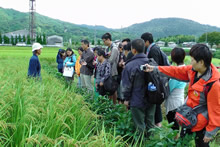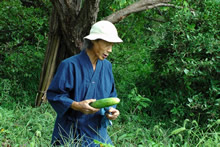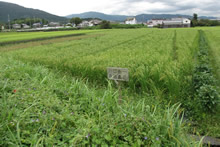By Sun Qiu (Director of Guizhou Institute of Integrated Rural Development, Guizhou Academy of Agricultural Science)
 The ten-day trip on Japan's ecological agriculture and communities was a trip with very rich content and profuse information, and the itinerary was tight. What left me with the strongest impression was Japan's Natural Farming. Before the trip my knowledge of "Natural Farming" had mostly been of its cultivation methods and skills. I had never reflected on its philosophy about the law of nature. After reading The One Straw Revolution by Fukuoka Masanobu, and visiting Japan to see with my own eyes, I have gained a new understanding of the meaning and value of Natural Farming. Because of this, I am truly thankful to PCD for the learning opportunity in Japan.
The ten-day trip on Japan's ecological agriculture and communities was a trip with very rich content and profuse information, and the itinerary was tight. What left me with the strongest impression was Japan's Natural Farming. Before the trip my knowledge of "Natural Farming" had mostly been of its cultivation methods and skills. I had never reflected on its philosophy about the law of nature. After reading The One Straw Revolution by Fukuoka Masanobu, and visiting Japan to see with my own eyes, I have gained a new understanding of the meaning and value of Natural Farming. Because of this, I am truly thankful to PCD for the learning opportunity in Japan.
From "letting things take their own course" to the "Natural Farming method"
It was as early as 1931 that Mr Okada Mokichi published the poem "Appreciating the natural law of reincarnation from a leaf that has withered", in which he sang praise to the will of Nature. He believed that "the earth is material and material things are produced in the earth and returned to the earth." The law of the recycling of matter is illuminated in his thought, which has life as its central idea. In fact, Mr Okada had learned from the wisdom of Laozi's philosophy of "letting things take their own course" (zi ran wu wei). With insights from Laozi's philosophy, he came up with the Natural Farming method (zi ran nong fa) [1]. In Chapter 15 of Laozi, it says: "Man is shaped by the earth, the earth is shaped by the sky, the sky is shaped by the dao [2], the dao is shaped by zi ran." Many aspects of human life are determined by the conditions of the "earth" on which human beings rely. They include the amount of vegetation, acidity, alkalinity and fertility of the soil. Many conditions of the "earth" are determined by the "sky", i.e. climatic factors like rainfall, temperature and sunshine, and climate itself follows the law of nature. That is to say the dao is modeled after zi ran. Human beings, earth and sky are the three essential factors, none of which is dispensable. That is why agriculture must follow the law of nature. This is the basic starting point of Natural Farming.
God is ziran and ziran is God
In accordance with Mr Okada's thoughts on natural farming, Mr Fukuoka Masanobu explicitly proposed "four wu" in his farming method of wu wei [3]. He proposed a method of cultivation that uses no fertiliser, no tilling, no pesticides and no weeding. He suggested fertilising the soil with decomposed and cleansed straw, human and animal manure and green fertiliser, and to control pests and diseases with their natural predators, physical barriers and mechanical methods. To control weeds, he advocated the rotation of crops, mulching, smothering weeds using other weeds, and tilling the land as little as possible if at all. Mr Fukuoka was reflecting on the threats modern agriculture posed to nature and human beings from a philosophical point of view. He said in the preface of the Chinese edition of TheNatural Way of Farming, "I firmly believe that genuine truth, goodness, beauty and happiness can only be found in nature. That is why I have been working towards an agricultural method that lets things take their course (wu wei zi ran) — no tilling, no fertilizer and a natural farming method that does not use any chemicals." Modern agriculture is built on the fundamental Western philosophy that sets human beings against the environment. That is why today we are exploiting and destroying nature for our own purpose. Agriculture, dominated by human desire, has already degenerated into an industry and a commercial activity—part of the industrial and commercial activity that enslaves us to oil and money. In the last few hundred years, monoculture has turned green into a colour of hypocrisy. Green exists only for human beings. For us humans, the only way out is to return to the position we used to have, as a member of all living things. Only in this way can human beings rediscover our soul and revive the green colour of the earth. I think the purpose of agriculture is for one to serve and become close to God. That is its essence. The reason I say this is because God is zi ran and zi ran is God.
According to Natural Farming, firstly, nature is the natural ecological system that is made up of animals, plants and microorganisms that are related to each other. All living things are related to each other through the food chain and material recycling, and are in a state of continual and repeated movement that has no beginning or end. Secondly, nature IS capital. Human beings should respect nature and collaborate with it rather than fight against nature. Humans should try to interfere with nature as little as possible or simply "do nothing", that is, practise "wu wei agriculture" so as to preserve the natural environment and ecological balance and to prevent polluting air, water, soil and agricultural products. Thirdly, the mistake of applying modern technology lies in "using human methods to replace all things and to neglect the power of nature while being confused about the nature of soil and the functions of fertilizer." Under these circumstances, humans' interference in nature and the changes introduced to nature in the name of "progress" have only brought chaos in the natural world, and have interrupted material recycling in ways that will eventually lead to the collapse and the end of the natural system. With a single purpose in mind, humans will never be able to understand nature. Humans must be reintegrated with nature and become part of nature to understand nature as a whole. Fourthly, humans, crops, cattle and all the animals and plants in our environment are equal in value, and are interrelated and mutually beneficial. There is not a question of who is at the centre of this world. "The human being is but a member of nature." "Natural farming" is an agricultural skill model developed on the basis of ecological philosophy that emphasises the conservation of biological resources. It contains many valuable thoughts which are critical of malpractices arising from the mechanisation, chemicalisation, industrialisation, intensification and mono-cultivation in modern agriculture. It attempts to build a new relationship of harmony between human beings and nature.
Returning to Nature and human awakening
Mr Kawaguchi Yoshikazu has practised natural farming on his farm for 33 years. He has been using conventional rice seeds and vegetable seeds (non-hybrid and non GM seeds) that he breeds himself, and using biodiversity to control pests and weeds. He does not till the land, and covers his fields with straw to nurture the soil. After many years of practice, he has accumulated a set of practical experience which proves that the balance of an agricultural system is more stable and sustainable without external inputs such as chemical fertiliser, pesticides, machines and biotechnology.
When practising natural and free-range rearing of chickens, Mr Yamagishi, the founder of the Yamagishi Association, became aware of the natural cycle of material and energy. He believed this method of chicken rearing was not simply a change in skills but a revolution in life philosophy. Members of the Yamagishi Association explained: "We practise agriculture not to gain a profit but to learn from agriculture and to learn to live in harmony with nature. The harmony of the natural world has provided us with insights on how we humans may get along with each other. There is still a lot we should learn from nature. When we make any decisions, we do not start from any one point. Instead we adopt a holistic view."
We reflect on the relationship between human beings and nature not only because nature is important to human beings. What is more important is that we need to reconsider the relationship between humans. A person has to put aside one's self. Faced with nature and others, one should transcend one's self, embrace the universe and spread goodness and love. The motto of the ecological community, the Honohana Family, reads: "Cultivate your mind before you cultivate the land". The purpose of practising agriculture is to learn from agriculture, to learn to get along with nature and other people. Agriculture is an engagement closest to nature. Through agriculture, humans engage in an exchange with nature and feel the beauty of nature and its meaning for humans. The rise of "natural farming" is humans returning to their position as children of nature. It is human beings' awakening to their true position.
Notes:
- Translator's note: The writer is trying to draw the reader's attention to the Chinese term, zi ran, which means nature. Laozi used this term to describe a state of spontaneous naturality in which human intervention was unnecessary, and Okada Mokichi applied this term to his farming method to imply the philosophy behind it.
- Translator's note: Literally meaning "way" or "path", dao in Daoist thought implies "the essential, unnamable process of the universe" (see Dao De Jing, in Wikipedia).
- Translator's note: Wu means "nothing" in Chinese and wu wei means "doing nothing".
Other related stories:
-
Mr Andrew McAulay, Chairperson of Management Committee, PCD: "Reflections on PCD's Trip to Japan in September 2011"
-
Partners' Sharing:
i. A trip that shook and swayed my heart ~ Ding Ying (Assistant Researcher, Institute of Biotechnology, Guizhou Academy of Agricultural Science) ii. Love without border: happiness is a kind of giving ~ Lei Jing (Lecturer,, College of Agriculture, Guangxi University) iii. Tokkoh—A beautiful kind of brainwashing ~ Lu Wendong (Assistant to Director, Guangxi Museum of Nationalities) iv. Cultivating one's mind before cultivating the land—Knowing "Natural Farming" anew ~ Sun Qiu (Director, Guizhou Institute of Integrated Rural Development, Guizhou Academy of Agricultural Science) v. How to love our home town from the bottom of our heart? ~ Wang Xiao Bo (Programme Advisor, Yunnan Office of PCD) -
Introduction to Main Visits:
i. Natural Farming ii. Sloth Club iii. Yamagishi Association - PCD Japan Study Trip Itinerary




